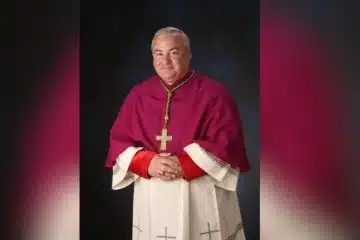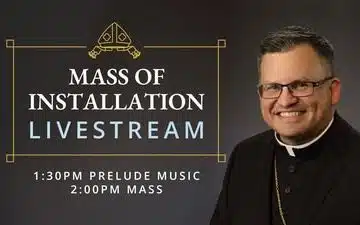‘They killed a man but created a saint,’ prelate says of slain priest
By Maria Wiering
ST. PAUL, Minn. (CNS) — Retired Archbishop Harry J. Flynn was rector of Mount St. Mary’s Seminary in Emmitsburg, Maryland, when he got a call in 1979 from an old friend from the seminary, asking if he could visit for a week.
That friend was Father Stanley Rother, a priest of the Archdiocese of Oklahoma City and a missionary in a rural part of Guatemala.
He picked up Father Rother from Dulles International Airport near Washington and was appalled by the horrific situation the priest described in Guatemala. Members of his congregation had disappeared and were presumed dead, victims of a civil war between the government and guerrilla groups.
“If they asked for a few more cents for picking coffee beans, they were considered communists, and a truck would come into the village that night, stop at the home of the man or woman who asked for a few more cents, take them out to the country, torture them, kill them, and then throw their bodies into a well to poison that well,” said Archbishop Flynn, who headed the Archdiocese of St. Paul and Minneapolis from 1995 to 2008.
Father Rother described the situation “with a passion,” Archbishop Flynn recalled. “It was haunting him. He said, ‘If I speak, they’ll kill me, but if keep silent, what kind of a shepherd would I be?'”
The friends shared meals together that week, but Father Rother spent his days praying at the seminary’s historic Lourdes grotto, a place he had loved while he and Archbishop Flynn were seminarians at “the Mount.” At the end of the week, he told then-Father Flynn, “I know what I must do. I must go back and speak.”
“But,” Archbishop Flynn recalled, “he also said this: ‘They’re not going to take me out and kill me somewhere in the country and then throw my body into a well.’ He said, ‘I’ll put up a fight like they’ve never seen before.'”
Archbishop Flynn took Father Rother to the airport and said goodbye. He knew it would be the last time he would see him alive. Two years later, in 1981, Archbishop Flynn opened a newspaper to read that an American priest had been killed in Guatemala. He didn’t have to read further to know it was Father Rother.
Archbishop Flynn was to be among others who knew the priest gathering in Oklahoma City’s Cox Convention Center Sept. 23 for Father Rother’s beatification. In December 2016, Pope Francis officially recognized Father Rother as a martyr, making him the first U.S.-born martyr recognized by the Catholic Church. Also attending will be members of the Rother family, including distant cousins from Minnesota.
Father Rother grew up on a farm near Okarche, Oklahoma. He was a farm boy with a knack for fixing things. After high school, he left home for seminary in Texas, but he was asked to leave after struggling with Latin. Undeterred, he transferred to the Emmitsburg seminary, where he met Archbishop Flynn, who was three classes ahead of him. Archbishop Flynn noted his friend’s deep prayer life.
“We could be downstairs in recreation, laughing and carrying on, and then the bell would ring to go up to chapel for night prayer and Stanley seemed to me to go right into prayer, which I found enviable,” Archbishop Flynn recalled in a recent interview with The Catholic Spirit, newspaper of the Minnesota archdiocese.
The two were in the seminary around the time that Pope John XXIII encouraged U.S. bishops to form partnerships between their dioceses and those in Latin America. The then-Diocese of Oklahoma City-Tulsa paired with the Diocese of Solola, Guatemala. In 1968, Father Rother was asked to minister there in Santiago Atitlan, a mission established by Franciscans. The Mayan people there had been without a priest for nearly a century.
People who knew Father Rother weren’t surprised that he returned again and again to Guatemala after the violence began, even with many opportunities to stay in the U.S. The Christmas before he died, he famously wrote to his archbishop, “A shepherd cannot run at the first sign of danger.”
On July 28, 1981, three men burst into the parish rectory, demanding Father Rother. He was hiding, but when the men threatened the life of one of his protectors, he emerged. He was ultimately gunned down in his rectory, his knuckles raw from the fight, his spattered blood staining the wall. The Guatemalans left the stains, and to this day, visitors — many of them pilgrims — can see the aftermath of what the gunmen did to their priest. The fatal bullet remains lodged in the wall.
In 1999, Archbishop Flynn traveled to Father Rother’s church in Santiago Atitlan, visited the room where he was shot to death and celebrated Mass in the parish church. Father Rother’s body returned to Oklahoma, but the missionary’s heart was left behind with the Guatemalans, who have since enshrined it as a relic.
Archbishop Flynn also prays for his friend’s intercession, keeping his photograph on his altar for Mass. He feels that he had a graced opportunity to be with Father Rother that summer while he was discerning his impending death.
“I’ll always remember sitting in the room where he was martyred, and sitting there and looking at his blood all over the wall, splattered, and experiencing anger in my heart with the people who did that to him — this gentle, gentle shepherd,” he said, “and then realizing what he would have said — something that Christ said, ‘They don’t even know what they’re doing,’ and they probably didn’t. … They killed a man, but they created a saint.”
– – –
Wiering is editor of The Catholic Spirit, newspaper of the Archdiocese of St. Paul and Minneapolis.
– – –
Copyright © 2017 Catholic News Service/U.S. Conference of Catholic Bishops. www.catholicnews.com. All rights reserved. Republishing or redistributing of CNS content, including by framing or similar means without prior permission, is prohibited. You may link to stories on our public site. This copy is for your personal, non-commercial use only. To request permission for republishing or redistributing of CNS content, please contact permissions at [email protected].













